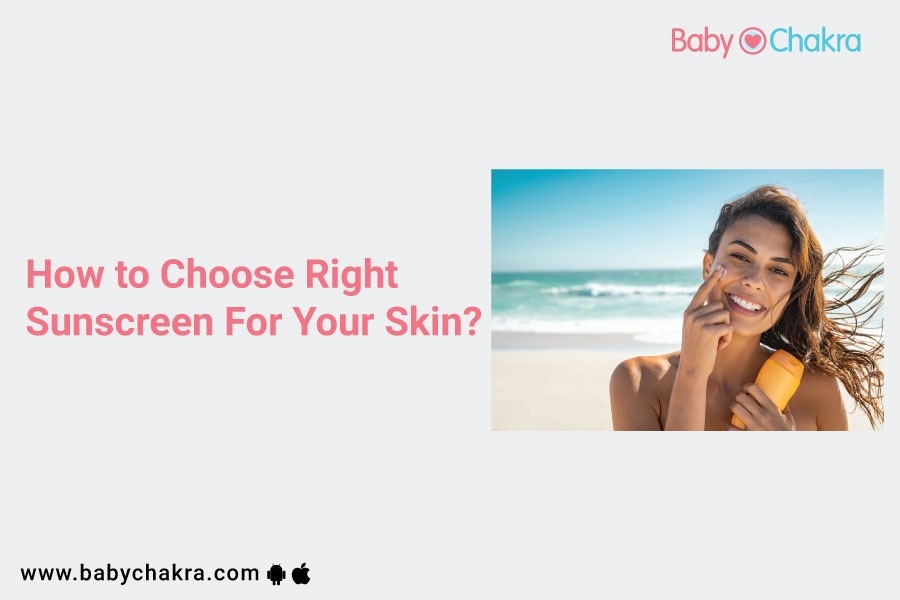
How To Choose The Right Sunscreen For Your Skin?
20 Nov 2021 | 4 min Read
Babychakra
Author | 1369 Articles
Medically reviewed by
Dr akshi pandita
Staying outdoors for extended periods can leave your skin damaged due to excessive sun exposure. Whether on your beach vacation or for your work, it is important to protect your skin with the right sunscreen or any other sun protection technology. We all understand that continuous UV rays of the sun can cause sunburn, wrinkles, skin damage, or even skin cancer. While staying indoors is not always possible, you can apply the right sunscreen to face. Also, read, the best skincare tips during pregnancy for you!
Benefits Of Sunscreen
Sunscreen protects your skin and lowers the chances of skin cancer. The detrimental effects of sun exposure are reduced when SPF is combined with other sun-protective practices such as wearing dark clothes and sunglasses. Sunscreen is one of the most potent preventative formulations for wrinkles, fine lines, and crow’s feet. Also, read best sunscreen for you.
How To Choose The Right Sunscreen?
When choosing a sunscreen for face, check for certain important things to get the best results out of it.
Consider SPF (Sun Protection Factor)
SPF measures how much UVB rays the sunscreen can filter out. Pick the sunscreen with SPF 15 to stay protected from daily exposure to UV rays. Dermatologists recommend using sunscreen with SPF 30 as it blocks 97 per cent of UVB rays. Ensure you apply sunscreen to various exposed areas of the skin every day.
Look For Ingredients
Check the active ingredients in the sunscreen. Look for formulas that contain titanium dioxide, zinc oxide, and avobenzone. Avoid sunscreen with retinyl palmitate as it may cause skin irritation.

Consider Your Skin Type
Before you pick sunscreen for the face, consider your skin type. Sunscreen with a water-based ingredient is good for oily skin and ensures that it is non-comedogenic to prevent acne formation.
Sunscreen Formulation
The distribution format of a sunscreen impacts how it feels and appears on a person’s skin. This is referred to as sunscreen formulation. There are three typical sunscreen formulas.
- Sunscreen Lotion: These are some of the most popular and hydrating sunscreen formulas. They come in various colors and textures to suit different skin types, and they provide good sun protection for the face.
- Sunscreen Spray: This type of sunscreen for the face is ideal for applying to hard-to-reach body areas. They are an excellent choice for people who have a lot of body hair.
- Sunscreen Stick: These are some of the most portable and least dirty choices available. Applying them to your skin and massaging them is how you use them. They are well suited for travel and have a very low risk of leaking.
Sunscreen Usage Tips
- Always wear sunscreen irrespective of the time of the year.
- Apply sunscreen to all exposed parts of the body, including your face, hands, feet, ears, neck, and top of the head (if your skin is exposed).
- Put a base coat of SPF 15 or 30 all over the exposed parts at least half an hour before stepping into the sun. Reapply every two hours.
- Always follow the label guidelines for reapplication.
Are you ready to start including SPF in your everyday skincare regimen? If you have enjoyed reading this article, do not forget to hit the ‘LIKE’ button and ‘SHARE’ this article with your friends and family.
#bbccareskin #allforskintypes #bestskincare #essentialskincare
Related Articles:
5 Tips For Healthy Skin: Here we bring you some of the best skincare tips for moms that you can conveniently follow and get healthy skin overnight. Check out here!
Baby Skincare Needs: This skincare is of the utmost requirement for babies, which you should follow. Explore here!
Newborn Skin Conditions: Newborn skin conditions that do not need treatment. Check them out now!
A


Related Topics for you
Suggestions offered by doctors on BabyChakra are of advisory nature i.e., for educational and informational purposes only. Content posted on, created for, or compiled by BabyChakra is not intended or designed to replace your doctor's independent judgment about any symptom, condition, or the appropriateness or risks of a procedure or treatment for a given person.
